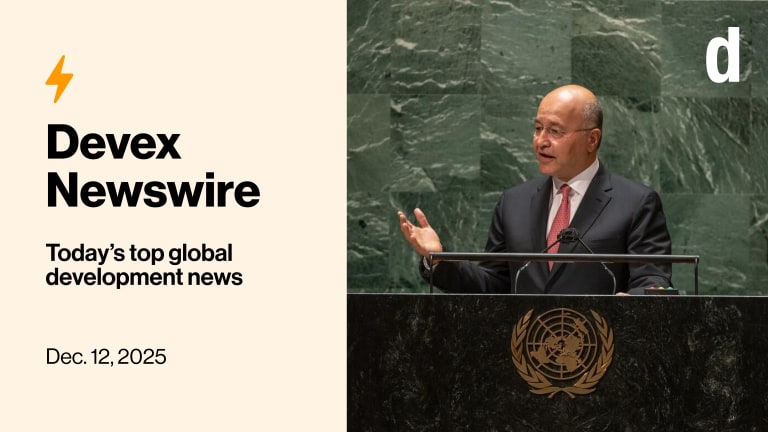Presented by Boehringer Ingelheim

Europe is revamping its budget strategy, shifting from traditional aid to more investment-driven projects that boost both regional stability and economic returns.
Also in today’s edition: We look at what the aid community is doing to help laid-off USAID workers find jobs.
+ Join us on April 2 for a conversation with Simon Meier, the head of BII Plus at British International Investment. He will break down what technical assistance really means in practice — from how it’s structured within investments to the types of support provided and the thematic areas where it delivers the greatest value. Register now.
Aid cuts, defense rises
The dramatic U.S. aid cuts may have been grabbing all the headlines, but Europe kicked off its own financial makeoverway before the Trump administration dominated the news.
This is a preview of Newswire
Sign up to this newsletter for an inside look at the biggest stories in global development, in your inbox daily.
Some of the latest cuts — such as the U.K.’s most recent deep slash — are outwardly motivated by a need to up defense in response to U.S. actions. However, Europe, as well as individual European countries, has been slowly moving from just dishing out cash to eyeing investments that might also fill their own pockets for years.
Rémy Rioux, who heads the French Development Agency, puts it this way: Official development assistance, or ODA, was a system worked out decades ago. What happens now is “just consistent with what the world has become, and we need a new architecture. We need to turn from assistance to investment — sustainable, inclusive investment.”
For the past half-decade, Europe's been steering its development dollars away from plain old grants toward juicier, investment-driven projects. Why? Wallets are lighter, neighboring troubles are upping the ante, and there’s a growing chorus of nationalistic voices.
Italy and France are trimming their aid budgets like crazy, while Switzerland and the U.K. are funneling those funds into beefing up their military might. Germany’s not far behind, eyeing a constitutional tweak to splash more cash on defense.
Even with all these cuts, Europe’s still a heavyweight in global aid, but don't expect that to continue without changes. The new game plan? Less about charity, more about mutual partnerships. Jean Van Wetter of Enabel thinks it’s about getting a bang for their buck, like cities luring businesses. However, he says, traditional ODA is still necessary to de-risk regions.
Read: Europe is cutting development spending, and it's not because of Trump (Pro)
+ Not yet a Devex Pro member? Start your 15-day free trial today to access all our expert analyses, insider insights, funding data, events, and more. Check out all the exclusive content available to you.
Loud dissent
Of course, those European cuts aren’t supported by everyone. At a U.K. Parliamentary committee hearing yesterday, former British development minister Andrew Mitchell said he was “absolutely horrified” by the cuts and advised that rather than the planned drop from 0.5% of gross national income to 0.3%, the U.K. government should gradually reduce the budget.
Mitchell, a long-time development advocate, also warned that if the U.K. cuts its development budget, others will step in to fill the gap — and gain the trust of recipient countries in the process.
“If we vacate, who do you think will come in? It will be the Chinese and the Russians and terrorists. It will be a rich recruiting vein for terrorism,” he said. “You cut the bilateral programs, you will open the space to people who are not friends of Britain — who wish us ill.”
Read: Former UK development minister ‘absolutely horrified’ by foreign aid cut
Community spirit
When USAID started cutting jobs, thousands were laid off or furloughed — and not just government staff, but contractors and partners too. Despite that, the development world didn’t sit still, Devex contributing reporter Rebecca Root writes. It rallied with job boards, virtual meetups, emergency funds, and loads of LinkedIn love.
“Our sector has always had a familial feel,” says funding adviser Joanne Sonenshine, who has compiled a list of job seekers and open positions. “We’re seeing people from all over the world doing whatever they can to help.”
LinkedIn is now the go-to support zone — full of coaching, job leads, and even “career reset” events. But all the help can feel like a firehose. “I imagine it could be difficult for people to navigate the many, many different resources that are popping up,” says career coach Colin Steele.
Need direction? There are free federal benefits, such as unemployment and counseling, expert-curated job lists, and yes, even AI can help with brainstorming which new roles might be suitable.
Dedicated sites such as USAID Stop-Work and the USAID Resource Hub are keeping track of the chaos and offering ways to take action or get practical support.
“The reality is people who are working at USAID have overcome a million challenges. ... This is just one more little brick wall,” says career development speaker Jeremy Schifeling. “I really do believe they can break through.”
Read more: For those laid off from USAID, new job resources are plentiful (Career)
+ Sign up for a Devex Career Account membership today to unlock all our exclusive career resources and get full access to the world’s largest global development job board.
A domino effect
Kenya’s Ministry of Health issued a stark warning: The Trump administration’s abrupt foreign aid freeze is triggering a “domino effect” that “imperils every link in the healthcare chain.” In a March 10 briefing to Kenyan President William Ruto, health officials warned that the U.S. move sparked staff layoffs, stock shortages, and suspended services in Kenya — especially for programs focused on HIV, malaria, and maternal care. “Kenya’s heavy reliance on donor-funded health systems has revealed deep systemic weaknesses,” the document said.
Dr. Debra Mulongo Barasa, the cabinet secretary for health, calls for urgent action: “It highlights not only the profound risks posed by the abrupt cessation of US donor funding ... but also the pressing need to transition smoothly, thereby forestalling any major disruptions to service access.”
The brief also warned of data system vulnerabilities, stalled rollout of Kenya’s Social Health Insurance Fund, and even health facility closures, Devex Senior Reporter Sara Jerving writes. “The risk of asset liquidation looms large,” it said.
Read: Kenyan govt internal memo warns of 'domino effect' of US health cuts
+ For more content like this, sign up for Devex CheckUp, our free, weekly global health newsletter.
From ‘Scandal’ to real stories
Bellamy Young, best known for playing President Mellie on the TV show “Scandal,” is stepping into a new role — real-world storyteller. Her podcast, “She Leads With Care,” spotlights women around the globe tackling tough issues with heart and grit.
“It couldn’t be a more important time for us all to remember what it means to care about each other,” she tells Devex Executive Vice President Kate Warren.
At the heart of the project is ethical storytelling. “No one can tell someone else’s story the way they tell it. … If you're able to lift them up or pass them the mic, that’s your honor and your joy.”
She shares the story of a women-led group in Tanzania that started a day care and grew it into a school. “All because someone asked, ‘What do you need?’ and then trusted the community to lead the solution.”
Young also acknowledges skepticism around foreign aid. “I would invite us all to not come from a mindset that is binary. … This is all about remembering that we are connected.”
So what keeps her going? “These conversations give me hope. … If we open our hearts, the love will still flow, and the progress will still be made.”
Read: From ‘Scandal’ to solidarity — Bellamy Young on women’s leadership
In other news
After two aid projects for child literacy and nutrition in Cambodia were canceled, China stepped in to fund similar initiatives. [Bloomberg]
Migrant deaths in Asia hit a record high in 2024, with at least 2,514 lives lost, according to the U.N.’s International Organization for Migration. [UN News]
Gaza’s Ministry of Health reported at least 62 deaths in the past 24 hours, while medical sources confirmed 23 fatalities, including seven children, in overnight attacks. [Al Jazeera]
Sign up to Newswire for an inside look at the biggest stories in global development.








